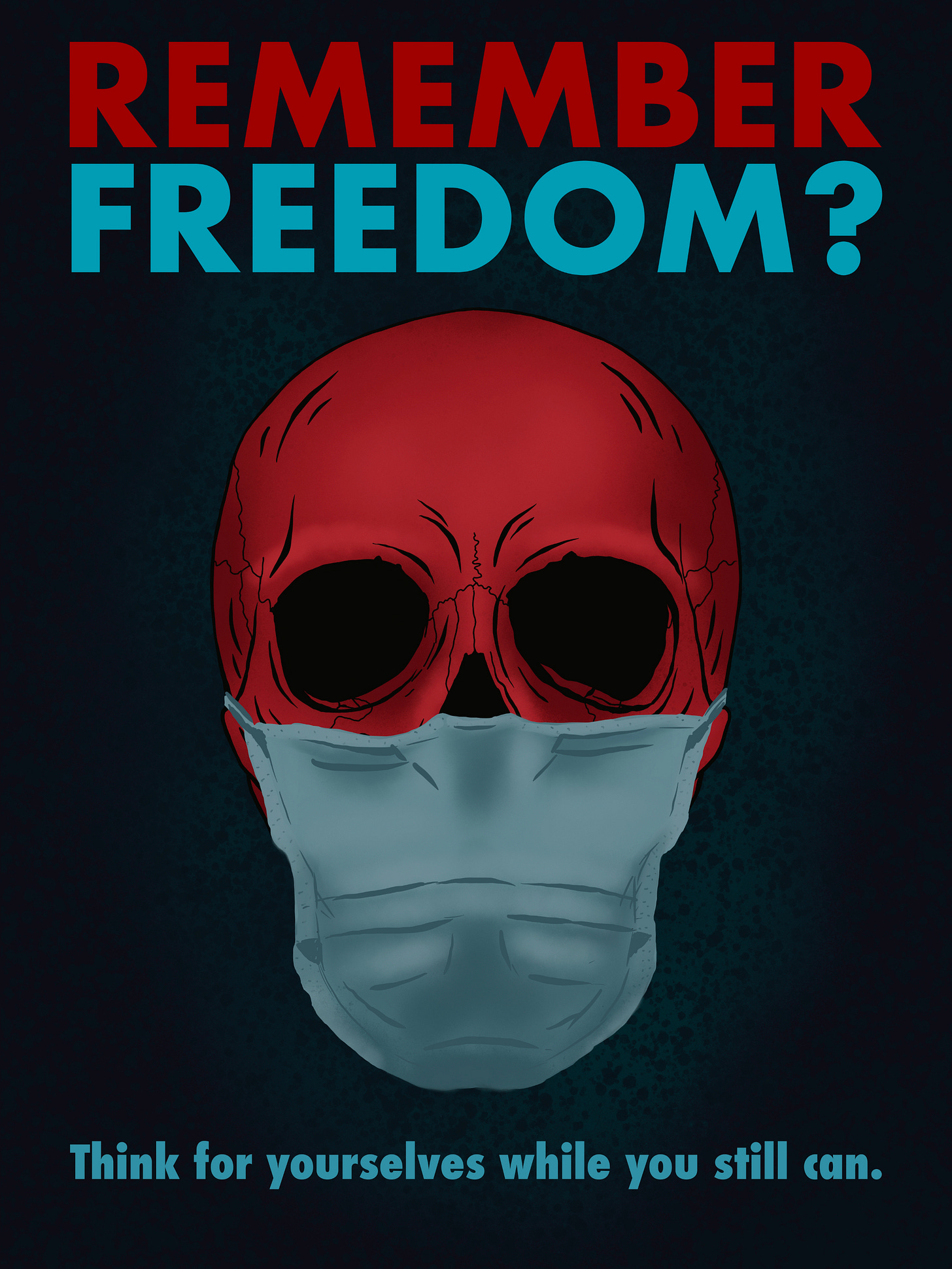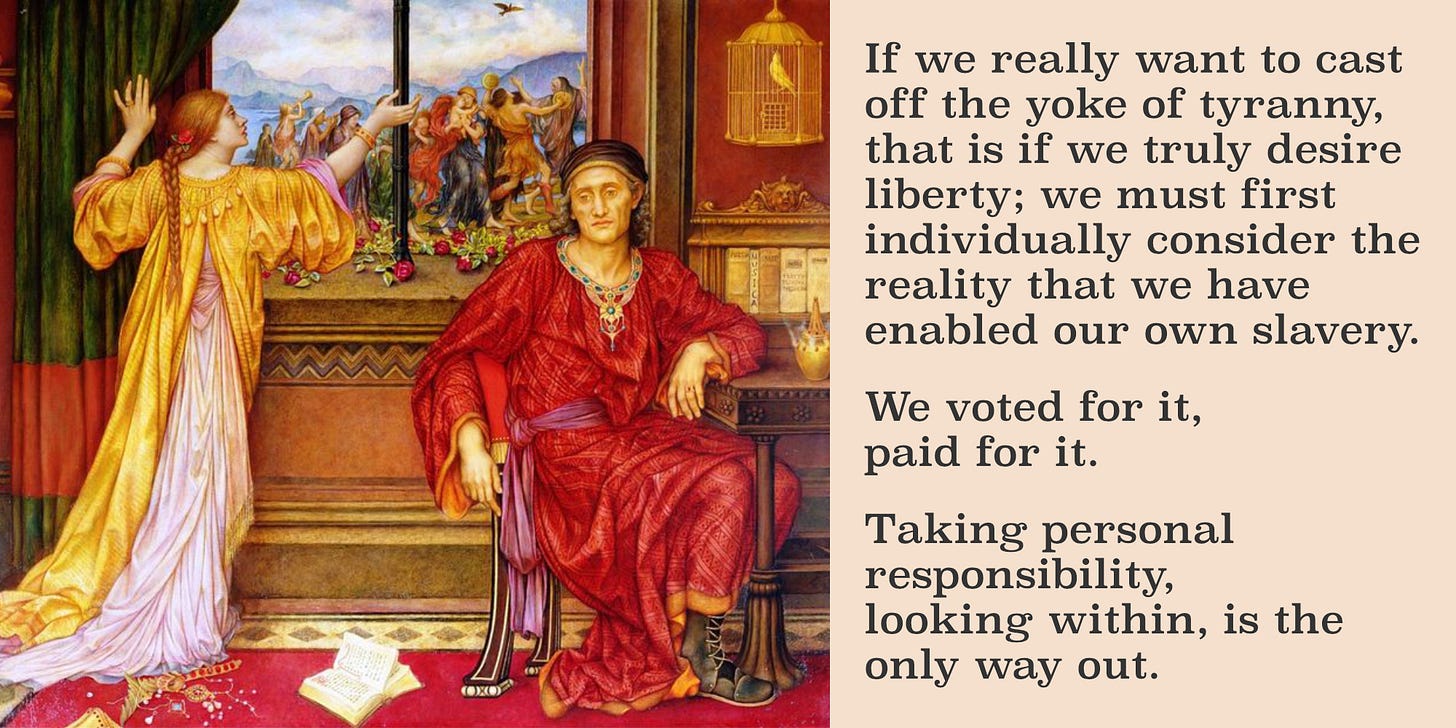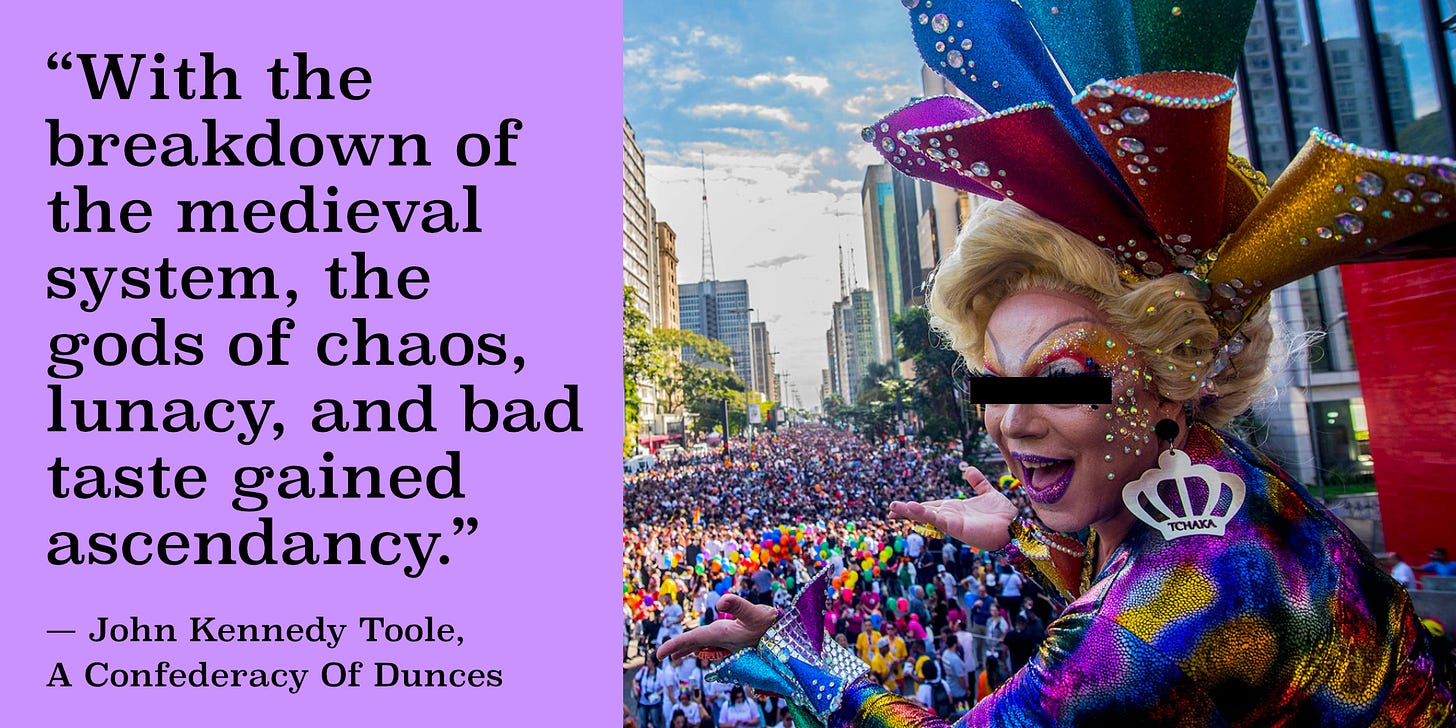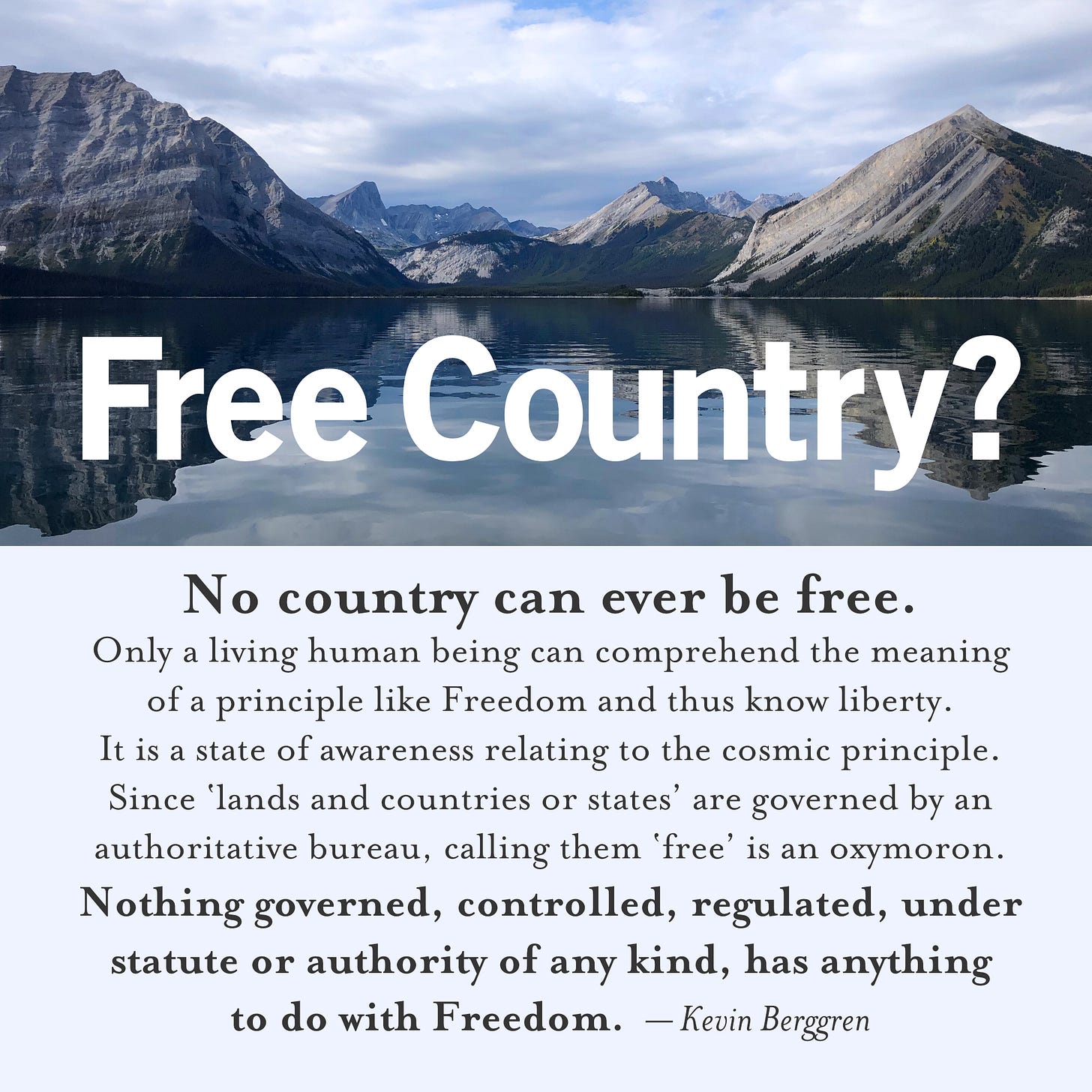Freedom is a natural, universal principle. In modern parlance the term is used in various ways, often distorted, its meaning obfuscated by meaningless euphemisms.
To comprehend the meaning behind the principle, what it actually is in relation to you and me as individuals in a real and practical sense, is what I’m concerned with here. I have zero interest in how I, or anyone else interprets the word, or what is believed about it. Natural principles simply are. They are immutable, as the foundations of creation and existence. Principles are not influenced by our preferences, beliefs or feelings. Principles transcend language and the jurisdiction of human academia or statute. My aim here is to delve into the essential meaning, so that through awareness and understanding, we can naturally embody it, live by it, weave the fabric of reality with it.
Were we ever free?
At the beginning of the global psychological operation, commonly referred to as the ‘pandemic’, I created a poster in response to the mandates and statutes being activated by the local and federal corporate service bureaus (government agents). It features a red skull wearing a surgical mask, with the headline ‘Remember Freedom?’. It was a response to me feeling outraged and disgusted that overnight our cities were turned into virtual prisons, bylaws that enforced faces to be covered, gatherings outlawed, singing outlawed. People were defined as biological threats with physical distancing requirements in place. I saw it as the beginning of an intensive campaign, by the collusion of governments and corporations, to end the illusion of what little liberties we imagined we may have enjoyed previously, once and for all. I saw the people in our communities bending the knee, weakly surrendering their rights, cowering in fear, squealing like rats upon their neighbours. The fear reached my heart as well, it sickened me. Not the fear of a wave of disease, but the fear of a mental and spiritual illness that spread faster than a grassfire on a drought stricken prairie. The only real virus: fear, which spawned the actual pandemic of authoritarianism, technocracy, mental and spiritual stultification, mass psychosis. After I made the poster, it occurred to me that I made an error in the title. How could anyone ‘remember freedom’? When were we ‘free’? How can anyone remember something that they never experienced? Who even knows what the word freedom really means?
I asked a lot of people the question ‘What is freedom? What does the word mean?’ I read a lot of academic and philosophical bullshit on the subject. I was seldom satisfied with the answers I received. People often begin their answer with ‘I believe…’, or ‘I feel…’ Its fine, ‘believe or feel’ however you like, but its unsatisfactory way to attempt to define a principle as fundamentally intrinsic as freedom. Beliefs and feelings have very little to do with the actual meanings behind the foundations of creation. I deeply desire to KNOW things, to know the meaning at the heart or essence of what is. This desire of mine for intrinsic, authentic meaning, goes directly against the grain of post-modernist rationale. Currently, ideologies of culture are being established on the authority of consensus, what people feel and believe, or rather what they are being told to feel and believe.
Increasingly I find that people I speak to seem to have difficulty forming thoughts, or make a statement with any self-authorization or originality at all. In order to be acceptable in the concensus dialect, thoughts about things, beliefs, ideas, all must be referenced by some institutional authority, some reference work; or some other percieved authority figure from academia, science, corporate, religious, political spheres. No one allows themselves the liberty to KNOW anything. Everything is subjective. Everyone can decide by how they feel, about how long a centimetre is, what the answers to mathematical equations are, or how biology works.
Ask yourself ‘how do I know what gravity is?’, can you explain what is and how it works? Can you do so without referencing some authority? Can you access your own intelligence and practically demonstrate it as a principle? You cannot. No one has ever been able to.
Its a perfect mechanism of mind control, to obfuscate ideas, information and the inherent meaning of things. To make things so very complicated that no one can truly comprehend. Authority figures, controllers of culture can easily decide what things mean and then legislate and create statutes based on their decisions, so that people will be obligated to observe and accept their verdicts without question.
I posted an image of my poster on social media platforms and immediately received some flack. One person was outraged that I would have the sheer audacity to imply that Canadians have anything to complain about, considering how many television channels and programs on Netflix that we have the ‘freedom’ to choose from, how many types of food products we have lining the shelves of our shops. Another person, similarly brought to my attention the fact that ‘in some other less free countries’, my design would land me in prison and how lucky I should consider myself to be able to ‘freely express myself’. All of the comments I received, caused me to take time to think about the ways people perceive their relative freedom, especially here in Canada, where we are now literal prisoners being held captive by an illegal, foreign occupation, which has declared war on the populace. It is obvious to thinking minds that no one is free as long as authoritarian agencies like governments control societies. It’s deeply disturbing to witness the fact that people in society actually believe themselves to have a measure of relative ‘freedom’, when they are so clearly nothing more than chattel slaves.
These observations led me to ask questions like: what exactly is freedom? How is the word defined? More importantly, what the true meaning behind the word? Can a person ever really be free? If so, what does that look like, being a free living being? How can a person converse intelligently about the subject of freedom, when the term is so often bandied about euphemistically, its meaning misunderstood, distorted or even feared.
It is abundantly clear that ‘we the people’ have an extremely confused relationship with real freedom as a universal principle, as well as with the simple meaning of the word. We can refer to dictionaries for the word definition, which we will look at later in this article, but the intrinsic meaning is what I’m after. I see the confused condition we find ourselves in today, as being the result of eons of mental conditioning by the controllers of mankind. Culture has been shaped, so that all of the basic sacred principles relating to life in our realm have been effectively occulted and their meanings obfuscated. This has been done in order to keep people veiled in ignorance as to the true nature of ourselves and the world. Keeping the masses confused and ignorant, by flooding their minds with conflicting or distorted information, too much data, or lies, is an obvious tool used to keep us easily controlled and manipulated.
A Gilded Cage: Fear of Freedom
“The fear of freedom is strong in us. We call it chaos or anarchy, and the words are threatening. We live in a true chaos of contradicting authorities, an age of conformism without community, of proximity without communication. We could only fear chaos if we imagined that it was unknown to us, but in fact we know it very well.
Germaine Greer1
One of the main human characteristics that has been used to so effectively exercise control over the masses is of course, fear. Simply put, humanity has been conditioned to fear anything unknown, or out of the norm. Thus we have been bred into captivity and to viscerally fear states we think of as ‘free’. If we as a species, did not fear freedom, if we knew what it is, we would be living in the true state of it, but we’re not are we? We mistakenly equate total freedom with ‘anarchy’, which is falsely equated with chaos. Rather than face the frightening reality of this mistaken notion of freedom, humanity chooses what it knows: authority, government, ultimately captivity and slavery.
I do realize that no one wants to think of themselves as being ‘afraid of freedom’, and perhaps you’re someone who knows what I’m talking about. Do a little honest introspection. Ask yourself, if you voted for a political representative or party, why did you do so? Are you able to lucidly explain how your action of voting in a political election is beneficial in any context? What did you imagine that casting your vote would accomplish? Please inform me. Will a man or woman, sometimes acting in the capacity of a politician, truly address and solve any of your personal issues or community concerns? Has any political system, at any time in human history ever worked for the benefit of humanity or the natural world? Does part of you fantasize or hope for a political solution to the global nightmare that the world seems to be spiralling inexorably into? If we can honestly examine our feelings and expectations, it may shed light our deepest motivations. It would appear that collectively, we’re afraid to be responsible for making the big decisions for ourselves and our communities. So we outsource the responsibility to politicians, government agents and other authority figures. Then we invent, intellectually reasonable sounding ideologies to label them with, ‘democracy’, etc. We hope things will work out, we sleep at night, with the right prescriptions.
However, when things go askew, when the bombs start falling, buildings collapse, prices of goods and services go sky high, money devlaues; we act like spoiled, entitled children surprised and outraged by the system of authoritarian government that we implemented. ‘What of our rights?’ We act all indignant, mystified when government fulfills its very purpose, by the authority WE empowered it with, by controlling us in ways we don’t like anymore. We deem it oppressive. We start calling it mean names like ‘tyranny’. As if that is not the meaning of every system of authority since the dawn of time.
The reality is that in our collective infantile desire for safety and security, through our fear of the responsibility of choice making, we handed over our liberty. Our liberty is the price for ‘safety’ and ‘security’ provided by the parent-like state. With our ignorance and terror, we forged the pretty golden bars of our gilded cage.
If we really want to cast off the yoke of tyranny, that is if we truly desire liberty; we must first individually consider the reality that we have enabled our own slavery. We voted for it, paid for it. Taking personal responsibility, looking within, is the only way out.
If we fear freedom, which we do, its simply because we lack the true understanding of what it means. Like overcoming and integrating any phobia, the fear of freedom must be confronted. All fears are brought into submission through full awareness and accurate knowledge. As long as we remain in denial of the simple fact that collectively, we actually fear freedom, we will most likely continue to suffer the tyrants and pogroms of our own creation.
For the purpose of this discussion, I propose that the principle reason we choose to submit to political authority is fear of the personal responsibility to make decisions on behalf of ourselves and our communities. We surrender our liberty rather than deal with the apprehension that may arise if we have to to accept the consequences of our choices.
I hope that through investigation of the origin of the word freedom, its linguistic definition, and more importantly the meaning of it, what it is as a principle; we may arrive at a better understanding of what it truly is. Through accurate knowledge we can move beyond fear and denial; claim the true meaning and substance of it for ourselves. To be authentically free, we must know what freedom is, we must comprehend it if we are to embody it as a principle. We also must embrace all of the responsibility that comes along with it rather than fearing it and cowering within the ‘safe’ confines of government authoritarianism or ideological prisons of the mind.
Freedom, what it isn’t
One way to get at a full understanding of what the word means is to look at what it doesn’t mean and some of the misconceptions surrounding it. It certainly does not mean ‘nothing left to lose’, as in popular folk rhetoric; that would be an impoverished and nihilistic reduction of something that is so much more nuanced and fundamental to a good, pure life.
There are certainly misconceptions, since we still hear terms and phrases like ‘relative freedom’ or ‘freedom fighter’. Those terms are misnomers, yet they are still bantered about and people proudly apply them to themselves. I believe the use of these phrases has been deliberately injected into our collective consciousness as a subtle form of misdirection. The meaning of the word freedom is instantly distorted by placing any adjective or adverb before or after it. Think about the phrase ‘fire fighter’. What does a fire fighter do? We say they ‘fight fires’. So what does a ‘freedom fighter’ do? We assume that we mean he/she ‘fights for freedom’, but the phrase could easily be taken to mean the opposite. When we get to the true meaning behind the word, you’ll realize that freedom cannot actually be fought for. Freedom doesn’t need any human to fight for it. There is no ‘cost’ to it, no ‘price’. Freedom IS. There is nothing to fight for, buy, or die for. Only to be aware of, to know, to choose, to BE.
Common terms, colloquialisms, euphemisms and ambiguous use of language cause confusion and error thinking. Linguistic misdirections work on an unconscious level to shift meaning away from the truth, to obfuscate or distort our perceptions of reality, or in this case the real meaning of a word and its proper application. This is the true meaning of ‘occult’, to hide from understanding.
In our current post-modern culture, people commonly define things loosely or relativistically. As is often incorrectly stated: ‘Freedom is relative’. This type of thinking is a mental virus. Are things in language and nature ‘relative’? Sure they are. But are principles established and set in place by our Creator relative or subjective? No, by nature they are not. If they were, then they could not be known as principles and the foundations of the universe would be weak.
As alluded to earlier, we live in an age where collective thought follows the weak pattern of logical fallacy, where even Truth is considered relative or subjective. Currently, even biological genders, formerly defined and based on the principle of genetic chromosome pairs, is viewed as subjective. How do you feel about reality or some evidence? If it doesn’t feel right according to your emotional state, if it doesn’t resonate, then you may emotionally reject the evidence since it does not align with your feeling. Ignoring obvious realities in favour of emotional impulses or pure populism is becoming the norm. This is the definition of following fallacious reasoning, or simply put, mental degeneration. Yes, consensus based thinking in culture has resulted in a collective of degenerates, a true ‘confederacy of dunces2’.
People make the error in logic of equating Freedom with a political ideology, or a condition that could ideally exist in society. Using slogans like ‘land of the free’, or ‘this is a free country’. Land cannot be free, nor can it not be free. ‘Land’ is the Earth, the common ground of all creation. The meaning of ‘land’ in ‘law’ and culture, has been obfuscated to mean something conceptual, titled territory bound by human made treaties on paper, enforced by statute, defended by law. Similarly, a ‘country’ is a territory bound by imaginary political borders, statute, treaties, protected by military, etc. Natural phenomena, creation, land, rocks, dirt, do not contemplate or entertain conceptual riddles of human thinking. Everything in nature, by its very existence is inherently free. A natural man or woman also exists in freedom, given their awareness of its reality. Only a living, sentient being can comprehend the meaning of a principle like Freedom and thus know liberty. It is a state of awareness relating to the cosmic principle.
Since ‘lands and countries or states’ are governed by an authoritative bureau, calling them ‘free’ is an oxymoron. Nothing governed, controlled, regulated, under statute or authority of any kind has anything to do with Freedom.
One of the most absurdly false associations with the word freedom is ‘democracy’. In academia, common parlance, in media, in movies, etc., people often use the terms interchangeably. Few pairs of words either connected or interchanged, insult the intelligence in a more devious way. ‘Democracy’ is a post-modern euphemism for the current, populist, morally acceptable form of political authoritarianism (government). In reality, it is the system of political control which has been the most effective in history, at creating a culture of people who continue to willingly surrender themselves body and soul to pure totalitarianism. Democracy, converts individual human beings into objects of the machine of state. All political systems naturally work the same necromancy, democracy has merely perfected the process.
Its quite easy for the reasoner who is able to avoid the pitfall of logical fallacy, to see what Freedom isn’t. Namely, it isn’t people being subject to any form of authority. So what IS it exactly?
Freedom IS
As described earlier, actual Freedom as a natural principle. It cannot be relative or subjective. Like Truth, it is what it is. It is self evident. It doesn’t need people to believe in it, academics to define it linguistically, or people to fight for it. The universe was designed to function based on natural principles, that exist within their own immutable, constant, objective reality. They transcend language, thought, opinion, emotion or philosophy. They are the living pillars which define the order of Creation.
Look at any word from the perspective of one language. English for example is extremely limiting. It has many occult mechanisms built into its structure, it can obfuscate understanding and can lead one away from the actual spirit or deeper meaning of a word. You can easily look up the dictionary definition of the words ‘free or freedom’ and get the limited, official gist of it (see footnote for an exploration of the etymolgy of the word ‘freedom’). 3
My point is that researching etymologies can be like diving down a series of rabbit holes that lead to various interpretations of word origins and definitions, which are at best a guide. Our inherent intelligence, if we learn to trust it, can lead us to deeper meaning, the meaning embedded within the fabric of Creation.
Of all the meanings attached to the word freedom, the one that rings the most true to me, is the one found in the book ‘The End of All Evil’ by Jeremy Locke. He writes:
“The definition of freedom is the infinite value of the human being.”
Here, freedom is represented in its true form as a principle, in relation to human beings, and as such it can be known, experienced, tested and lived. It is so simple. The human being has infinite value. YOU have infinite value. He writes further:
“To understand freedom is to understand the value of a person (man or woman)… To understand your own worth is to understand the nature of liberty.”
We as human beings are the beloved creations of our Sovereign Creator, as such we are infinitely valued and beloved. The awareness of the limitless reality of our own personal value is the meaning of freedom. It is an enlightened state of awareness. It is that simple. If you can accept and comprehend this truth, then you embody it. You live it. You are free.
Freedom as a principle and a state of being is eternal and immutable. A man or woman with awareness of their own value, dwells in that state by will and by choice, regardless of their physical location, political or financial situation, influences or the actions of other people. A man may be subjected to evil actions by his fellows and placed in a cage, his ability to move about freely limited, but unless he forgets or gives up his awareness of his own value, he will continue to embody the state of Freedom and comprehend its true nature. Thus, the ability to DO something can be limited by outside forces, but a human being’s state of awareness of their own value, can only be surrendered by the individual. A person can be fooled into denying its existence, or be threatened and cajoled into relinquishing it. It cannot ever be taken.
The Opposite of Freedom
The antithesis of freedom is the principle of evil. Evil is not some unknowable, occult supernatural force or entity. Like any principle, a being may at times embody it, or act in a capacity that promotes it. On the vital importance of comprehending the subject of evil, Locke writes:
“Everything that is evil teaches people that they have limited value… It is the nature of evil to create artificially complex ideas. It does this to hide or obfuscate the freedom it destroys. If you remove the complexities and fears from your life you will find a plain and beautiful truth. This truth is the nature of your worth…Everything that evil wants is to disguise and destroy your value. All authority is created by evil men to disguise your worth. The crucial key for understanding our world is to understand the nature of evil. Evil challenges the value of people by denying them the opportunity to make their own choices; by denying them the chance to grow strong in learning and understanding.”
Full awareness of the nature of the principle of evil is crucial if one is to live by and embody freedom. Knowing what freedom isn’t is as important as knowing what it truly is. Locke shows us the meaning behind the word symbols, revealing a deeper truth so that we can recognize any action, ideas or thoughts that strive to disguise, obfuscate or deny our inherent value. This awareness can prevent us from acting, speaking or thinking in ways that deny our value, or to see through anything in culture or society that does so.
You are the key
A human being who comprehends Freedom, knows that it does not in any way depend upon anything outside. The only way we cannot be free is by giving in to evil, by denying our own value and surrendering to human, alien or demonic authority. We embody and live real freedom by our knowing its true meaning. Remain focused on this simple truth: You have infinite value.
I’m ending this article with the conclusion of Jeremy Locke’s brilliant book. I couldn’t encapsulate the concept of Freedom any more beautifully than this:
“You have infinite value
With freedom, all things are possible. Technology, health, wealth and knowledge are all facets of power. Each of these improve the lives of human beings. The fruits of liberty are everything good; and bring peace, prosperity and joy.
You live after the era of wars, and the only remaining step in the pattern of liberty is to answer the question held in the minds of people around the world. The lies of millennia have not stopped the unquenchable thirst for freedom that grows within the hearts of every person on earth. They are poised and ready to take the freedom that is rightfully theirs. They need only hear that freedom is possible, that freedom is real.
You are the key. To teach the people of earth the value that they have within themselves you need only speak, and tell them that every good thing is theirs to have. You need only tell them that the glory of liberty is real, and that it belongs to them.
This war is already won. Evil has already been crippled. Every human being on earth is ready to rise and let the chains that held them crumble to dust. This world will be free. If you can see your own value, then stand tall. Ye are called unto liberty.” — The End of All Evil
Why democracy has created true global totalitarianism: Tocqueville and Totalitarian Democracy in America
https://theimaginativeconservative.org/2021/02/tocqueville-totalitarian-democracy-america-habi-zhang.html
The most lucid explanations of the principles of freedom, truth and evil:
The End of All Evil, by Jeremy Locke, 2005. Links to the audio book:
The End of All Evil (on Rumble)
The End of All Evil (on Bitchute)
The End of All Evil (on YouTube)
Germaine Greer, Introduction - The Female Eunuch (1970)
John Kennedy Toole, A Confederacy of Dunces
Anytime you can look up the pedantic definition of any word in any dictionary, you’ll be only slightly nearer the goal of understanding the meaning.
Dictionary definitions are fine from a very basic, elementary perspective regarding the general use of the word. At this point, its worth digging a bit deeper. What is the ancient origin of the word ‘freedom’?
According to the Online Etymology Dictionary, in Old English, freodom means “power of self-determination, state of free will; emancipation from slavery, deliverance;” or free (adj.) + -dom, meaning “exemption from arbitrary or despotic control, civil liberty”, from late 14c.
Even more interestingly, from the same source, if we break it down:
free (adj.) Old English freo “exempt from; not in bondage, acting of one's own will,” also “noble; joyful,” from Proto-Germanic friaz “beloved; not in bondage”, from PIE priy-a- “dear, beloved,” from root pri- “to love.”
The sense evolution from “to love” to “free” is perhaps from the terms “beloved” or “friend” being applied to the free members of one’s clan (as opposed to slaves; compare Latin liberi, meaning both “free persons” and “children of a family”). For the older sense in Germanic, compare Gothic frijon “to love;”.
pri-, Proto-Indo-European root meaning “to love.” In some languages (notably Germanic and Celtic) it developed derivatives with the sense “free, not in bondage,” perhaps via “beloved” or “friend” being applied to the free members of one’s clan (as opposed to slaves).
Combining the prefix ‘free’ with the suffix ‘dom’ combines two thoughts or meanings and adds dimension to the word.
-dom
abstract suffix of state, from Old English dom “statute, judgment”. Originally an independent word, but already active as a suffix in Old English (as in freodom, wisdom). Cognate with German -tum (Old High German tuom). “Jurisdiction,” hence “province, state, condition, quality.”
With these things in mind, the original word definition of freedom would mean ‘the state or quality of being beloved’, or ‘province of friends’. Interestingly, this digging points in the direction of a state of being.







